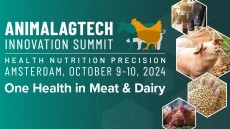Insights from COCERAL's 2023 survey: Prevalence and severity of mycotoxin contamination set to increase

COCERAL, representing the European agrosupply distributors and grain trading companies, has just unveiled its 2023 Mycotoxins Survey. Spanning across 14 countries and involving 19 key players, the review evaluates the current state of mycotoxin management and anticipates future challenges and trends that could reshape the industry.
Effective sampling and testing, along with proactive measures and scientific collaboration, are essential in managing mycotoxins, ensuring food and feed safety, and mitigating economic impacts, it concludes.
The survey saw participation from members in Austria, Belgium, Bulgaria, Croatia, Denmark, France, Greece, Hungary, Ireland, Italy, the Netherlands, Romania, Spain, and the UK. Together, they represent a significant portion of the market, covering over 36 million tons of traded grains—more than 16% of the total EU market share.
Warning about unpredictable food and feed safety issues
“Our report finds that a rise in mycotoxin prevalence will lead to unpredictable food and feed safety issues, causing economic repercussions for grain collectors and traders.
“These repercussions include increased sampling, testing, recalls, and rejections, which will ultimately alter food and feed security patterns at both EU and international levels,” Gianluca Nurra, secretary general of EUROMALT, scientific and technical advisor at COCERAL and UNISTOCK Europe, tells FeedNavigator.
He says COCERAL members will do their utmost to ensure these constraints are contained.
“They recommend that farmers perform meteorological surveys during critical stages of the crops, such as flowering, use only certified seed material, adopt better crop rotation practices, and apply allowed fungicides at the right dose and time when weather conditions demand it. Additionally, farmers should harvest grains when they are ready and dry, then cool the grains slowly and gently in storage. Implementing good storage practices, including cooling and ventilation, is crucial to avoid storage mycotoxins.
“Moreover, our members emphasize the importance of using contract specifications and internal monitoring programs. They advocate for increased sampling and testing at all stages, focusing on collection and pre-shipment, and always employing skilled personnel and accredited laboratories when using confirmatory test methods such as HPLC and LC-MS-MS.”
COCERAL says its members routinely perform mycotoxin sampling and testing at all stages—collection, storage, and pre-shipment—using international standards (GAFTA, FOSFA, EN/ISO 24333:2009), skilled surveyors, and ISO17025 accredited testing laboratories. This ensures raw materials comply with relevant EU food and feed safety legislation, it reports.
Sampling and testing protocols
However, Nurra emphasizes that new tools should be made available for collectors and traders to assess mycotoxins occurrence in grains, oilseeds, and pulses better and faster.
Right now, there is a lack or reliable quick tests for certain mycotoxins such as ergot alkaloids, he contends.
Accurate mycotoxin testing relies on representative samples, as mycotoxins are unevenly distributed in cargoes and samples, adds Nurra.

Climate change
Additionally, increased cooperation with the scientific community - the European Food Safety Authority (EFSA) and the UN’s Food and Agriculture Organization (FAO) - is essential, says Nurra.
Such collaboration will help stakeholders understand the relationship between climate change effects and mycotoxin prevalence, he maintains.
A new section of the survey explored anticipated challenges related to regulatory changes and climate impacts. Respondents foresee an increase in certain mycotoxins over the next 10 years: aflatoxins and ochratoxins in corn, deoxynivalenol, sum of T-2 and H-T2 toxins in all cereals and zearalenone and Alternaria toxins in oilseeds.
Although the observed level of mycotoxins in certain EU member states is very low and very far from EU maximum limits, climate change might cause unpredictable results, the report warns.
The review also highlights that maize, wheat, and barley are the most tested crops.
COCERAL members are, on the one hand, grain collectors and international traders of cereals, oilseeds, pulses, olive oil, oils and fats, animal feed, but also agrosupply distributors, who often advise farmers all along the production cycle - on the choice of seed varieties and the of use of fertilizers and plant protection products.

















